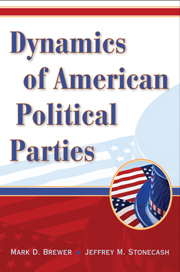Book contents
- Frontmatter
- Contents
- Figures and Tables
- Preface
- 1 DEMOCRACY, REPRESENTATION, AND PARTIES
- 2 OVERVIEW: SOCIAL CHANGE AND SHIFTING PARTY BASES
- 3 TAKING SHAPE: PARTY COALITIONS IN THE POST-BELLUM NINETEENTH CENTURY
- 4 REPUBLICAN ASCENDANCY AND DEMOCRATIC EFFORTS TO RESPOND, 1896–1928
- 5 TABLES TURN: THE NEW DEAL ERA AND DEMOCRATIC DOMINANCE, 1932–1948
- 6 THE DEMOCRATIC DRIVE TO THE GREAT SOCIETY
- 7 REPUBLICANS: REASSERTING CONSERVATIVE PRINCIPLES AND SEEKING A MAJORITY
- 8 THE STRUGGLE OF DEMOCRATS TO INTERPRET CHANGE AND RESPOND
- 9 GEORGE BUSH AND FURTHER POLARIZATION
- 10 THE 2008 ELECTION AND ITS INTERPRETATION
- 11 PARTIES AND THE PURSUIT OF MAJORITIES
- Bibliography
- Index
- References
8 - THE STRUGGLE OF DEMOCRATS TO INTERPRET CHANGE AND RESPOND
Published online by Cambridge University Press: 05 June 2012
- Frontmatter
- Contents
- Figures and Tables
- Preface
- 1 DEMOCRACY, REPRESENTATION, AND PARTIES
- 2 OVERVIEW: SOCIAL CHANGE AND SHIFTING PARTY BASES
- 3 TAKING SHAPE: PARTY COALITIONS IN THE POST-BELLUM NINETEENTH CENTURY
- 4 REPUBLICAN ASCENDANCY AND DEMOCRATIC EFFORTS TO RESPOND, 1896–1928
- 5 TABLES TURN: THE NEW DEAL ERA AND DEMOCRATIC DOMINANCE, 1932–1948
- 6 THE DEMOCRATIC DRIVE TO THE GREAT SOCIETY
- 7 REPUBLICANS: REASSERTING CONSERVATIVE PRINCIPLES AND SEEKING A MAJORITY
- 8 THE STRUGGLE OF DEMOCRATS TO INTERPRET CHANGE AND RESPOND
- 9 GEORGE BUSH AND FURTHER POLARIZATION
- 10 THE 2008 ELECTION AND ITS INTERPRETATION
- 11 PARTIES AND THE PURSUIT OF MAJORITIES
- Bibliography
- Index
- References
Summary
In the mid-1960s, the Democratic Party had a sizeable majority in Congress and held the presidency, just as they had for most of the previous forty years. They enacted a wide array of legislation to address a variety of social problems and established new social welfare programs such as Medicaid and Medicare. Yet by 1969 Republican Richard Nixon, a presumably washed-up politician, was sitting in the Oval Office, and Democrats were being widely attacked as the party of social disorder and undeserving minorities, and the party that could not or would not support traditional American values. The 1968 presidential nominating process had torn the party apart, and many were uncertain about how the Democratic Party could possibly reconcile its conflicting factions.
As gloomy as things appeared in 1969, the reality is that it was only the beginning of their struggles. In 1972 with a new set of rules for nominating presidential candidates, the party selected South Dakota Senator George McGovern as its candidate. McGovern was quickly labeled as very liberal (Nixon went even further, regularly calling McGovern a radical) and he suffered a crushing defeat in 1972, taking many congressional Democrats with him. The implosion of the Nixon presidency with Watergate gave the party a temporary reprieve in 1974, and the party significantly increased its majorities in both chambers of Congress in those elections.
- Type
- Chapter
- Information
- Dynamics of American Political Parties , pp. 145 - 165Publisher: Cambridge University PressPrint publication year: 2009



